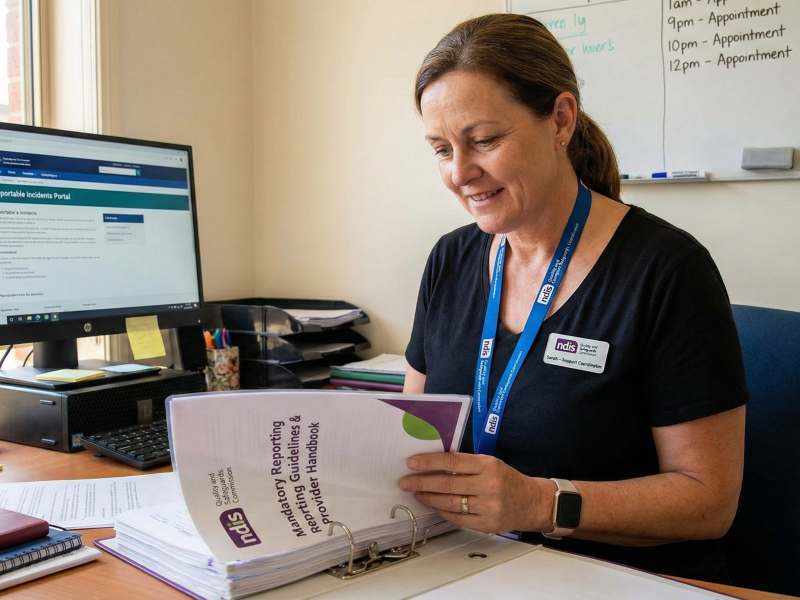Acquiring clients from the National Disability Insurance Scheme (NDIS) is crucial for Providers and support workers who would like to improve the lives of individuals with disabilities. With the ongoing growth of the NDIS, so does the need for quality, individualised services. Whether you are a new registered Provider, an independent support worker, or an established organisation, securing and maintaining clients can be daunting. A strategic approach involving digital marketing, relationship-building, and outstanding service delivery is key to standing out in a competitive landscape. In this guide, we’ll explore practical ways to find and attract NDIS clients and how to build long-lasting relationships with them.
Want to Attract More NDIS Clients?
Get expert advice on how to market your services, connect with clients, and grow your practice.
Top 10 Ways To Get NDIS Clients
1. Build a Strong Online Presence
An effective online presence helps NDIS clients and their families find and trust your services. Begin with a professional website that explains your services, rates, and how you assist NDIS Participants.
- Have testimonials, pictures, and an FAQ page that addresses basic questions.
- By applying Search Engine Optimisation (SEO) methods, you can work to ensure that your site comes up higher in Google searches.
- Regularly post helpful content on your website’s blog page, including advice on how to navigate NDIS funding or select the correct services. This presents you as an authority and boosts your exposure.
2. Register with NDIS Provider Directories
A number of credible online directories list NDIS Providers and independent support workers for you to review. Mable, Clickability, MyCareSpace, Avaana and Hireup are favoured by Participants as well as Support Coordinators when looking for service providers to meet specific Participant needs.
- All of these directories enable you to develop comprehensive profiles depicting your experience, services, availability, and clients’ reviews.
- If you are going to use online directories, ensure to keep your listings updated, reply to queries promptly, and have a high rating with reviews to establish trust among potential clients.
3. Network with Support Coordinators
Support Coordinators are decision-makers who assist NDIS Participants in managing their funding and choosing appropriate Providers to meet their disability needs. By establishing good professional contacts with local support coordinators, your business can potentially receive continuous referrals.
- Make contact with a capabilities statement or service brochure, mention your specialisations, and propose collaborating on difficult cases.
- Continuous follow-ups and providing good service will cement these relationships in the long run.
4. Leverage Social Media
Social media sites such as Facebook, Instagram, and LinkedIn can enable you to interact with both clients and professionals in your field. These sites also provide means for you to post targeted adverts to attract families and Participants in your locality.
- Visual material such as short clips introducing your services or behind-the-scenes shots of your operation fares particularly well.
- Post useful information, client testimonials, and news about your services.
- Participate in discussion groups related to NDIS and have useful interactions.
5. Create a Google Business Profile
Google My Business (GMB) is a free service that enables local service professionals to show up in Google Maps listings and search results. When people search “NDIS Provider near me,” your profile can surface with directions, hours of operation, reviews, and contact details. Update your GMB profile regularly with the latest photos, services, and client reviews to increase your local rankings and trustworthiness.
6. Provide Free Consultations
Often, Participants and their families are not entirely sure what they require from you to meet support needs. By providing a free initial consultation that outlines your services allows consumers to learn about your business method and establish rapport with you while shopping around. Free consultations establish trust and tend to result in long-term client relationships.
- Meetings can be an online or face-to-face
- You should outline how your services fit into the NDIS Participant’s Plan.
7. Collaborate with Allied Health Professionals
Allied Health professionals such as Occupational Therapists, Physiotherapists, and Psychologists tend to work with NDIS Participants to provide therapeutic supports. They may know areas of need which you can assist with, such as transport or assistance with daily living, when speaking to their own clients.
- Joint referrals become possible when you work together with other Providers.
- Being involved in multi-disciplinary meetings and working together on collaborative care planning can help solidify referral relationships.
8. Go to the NDIS and Disability Expos
Being a part of local expos and community activities is a great means of interacting with potential customers in person. These activities bring Participants, carers, support coordinators, and other Providers together.
- Take professional pamphlets, business cards, and testimonials to display your services.
- A booth or mini-seminar can also make your business appear reliable and invested.
9. Utilise Paid Advertising
Online marketing can be an effective means of reaching potential customers. By utilising resources such as Google Ads and Facebook Ads, you are enabled to promote your services specific groups of people, interests, and geographic areas.
- You can design campaigns based on individual services, like personal care or home adaptations.
- Even a low advertising budget can create strong leads when done correctly.
10. Provide Outstanding Service and Request Referrals
Satisfied clients are your best marketers. Providing consistent, high-quality, and person-centred care increases the likelihood of word-of-mouth referrals.
- Encourage happy clients or their families to refer friends or leave reviews on your website, GMB, or social media.
- A simple referral program or thank-you note showing appreciation can go a long way!
Marketing Strategies to Find NDIS Participants
To succeed in the NDIS industry, marketing needs to be ethical, Participant-focused, and open.
Listed below are some useful tips:
- Email Marketing: Send out regular newsletters with useful advice, updates, and testimonials.
- Video Marketing: Produce videos introducing staff, demonstrating everyday routines, or describing how NDIS funding operates.
- Blogging: Post informative blog articles responding to typical Participant inquiries.
- Local Flyers and Posters: Circulate them in community centres, hospitals, and clinics.
- Referral Networks: Form partnerships with GPs, schools, hospitals, and local councils.
- Messaging: Consistency and clarity of your service messages are critical. Ensure that your tone is warm, professional, and Participant focused.
Referrals Start With Reputation – We’ll Help You Build Both
From networking tips to service refinement, we guide NDIS providers toward lasting impact.
Conclusion
Securing NDIS clients is more than Registering as an NDIS Provider. It is a mix of visibility, reliability, and targeted outreach. By establishing a robust online presence, connecting with support coordinators, employing electronic and community marketing, and continually providing excellent care, you can establish a sustainable source of clients to support your business longevity. Ensure to always prioritise Participants’ needs, have open communication, and keep on enhancing your skills and services; not only to bring new clients, but to also establish significant, long-term relationships that benefit all involved.
FAQs
1. What are the best platforms to connect with NDIS Participants?
Some of the most effective platforms are MyCareSpace, Clickability, Mable, Avaana and Hireup. These websites draw Participants who are actively looking for assistance. Google My Business, Facebook groups, and LinkedIn are also useful resources for finding clients and industry professionals to connect with. Expos and Provider networks are other ways to potentially break into B2B opportunities.
2. What are some ways I can build long-term relationships with NDIS clients?
Emphasise transparent communication, stable service delivery, and attentive listening. Identify your clients’ objectives, maintain them engaged in decision-making, and adjust your services as their needs change. Frequent follow-ups and feedback sessions may enhance trust. Professional documentation of progress and prompt response to any issues can generate satisfaction and continuity.
3. How do I distinguish myself from other NDIS service Providers?
To differentiate yourself, emphasise your specialisation (e.g., mental health support work, 24/7 nursing availability, early intervention occupational therapy), provide flexible and culturally responsive care, and form close connections with clients. Share actual stories, client feedback, and your credentials on your advertising material. Transparency, responsiveness, and empathy assist clients in selecting you over competitors.


